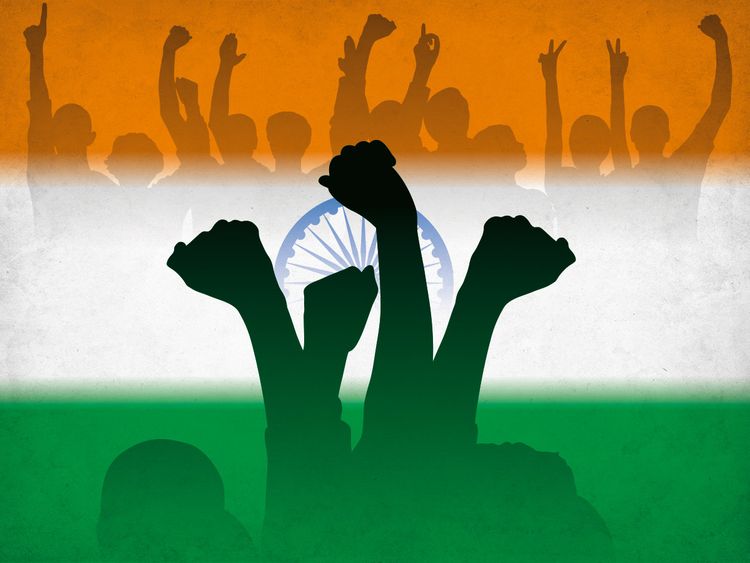
Dr. Smit Gupta 25 December 2023
India, often celebrated as the world’s most populous democracy, is grappling with a series of challenges that threaten its democratic foundations. The suspension of 141 members of its Parliament on December 18 and 19 serves as a poignant manifestation of these concerns. While the government cites “unruly behavior” as the rationale, a growing chorus of critics contends that such actions are emblematic of a broader authoritarian trend aimed at stifling dissent, curtailing democratic freedoms, and consolidating power.
The emergence and consolidation of the INDIA bloc, a formidable coalition comprising virtually every party outside the ruling Bharatiya Janata Party (BJP), signals a unified front against perceived authoritarianism. Describing the suspensions as the “murder of democracy,” this bloc underscores the opposition’s growing apprehensions and the erosion of parliamentary decorum and integrity. Such tactics, many argue, not only undermine democratic institutions but also threaten the very essence of India’s pluralistic society.
Concurrently, the relentless persecution and suppression of independent media outlets, epitomized by the Income Tax (IT) department’s aggressive actions against Newsclick, spotlight the escalating threats to press freedom. By virtually paralyzing Newsclick’s financial operations and detaining its leadership, the government aims to muzzle critical voices, diminish investigative journalism, and control the national narrative. This assault on press freedom undermines the public’s right to information, transparency, and accountability, thereby compromising the democratic principles enshrined in India’s constitution.
Distinguished intellectuals and journalists, including Nobel laureate Amartya Sen and esteemed journalist N. Ram, have raised alarm bells about India’s deteriorating democratic landscape. Sen’s profound assertion that “democracy is government by discussion” illuminates the pervasive climate of fear, intimidation, and self-censorship plaguing Indian society. Similarly, N. Ram’s incisive critique of the “decaying” democratic institutions underscores the urgent need for comprehensive reforms, institutional safeguards, and global solidarity to preserve India’s democratic legacy.
International human rights organizations, such as Amnesty International, the Committee to Protect Journalists, and Reporters Without Borders, have unequivocally condemned the Indian government’s escalating assaults on press freedom, civil liberties, and democratic norms. The deployment of sophisticated surveillance technologies, including Pegasus, to monitor journalists, activists, and political opponents exemplifies the government’s draconian tactics to suppress dissent, control narratives, and consolidate power. Such repressive measures not only undermine India’s democratic principles but also exacerbate societal divisions, erode public trust, and tarnish its global reputation.
The New York Times’ comprehensive coverage of India’s deteriorating press freedom, democratic governance, and civil liberties amplifies these concerns on the global stage. The government’s concerted efforts to manipulate media narratives, particularly during the COVID-19 pandemic, reveal a troubling trend towards authoritarianism, information control, and dissent suppression. While judicial interventions offer fleeting reprieves, they raise fundamental questions about the judiciary’s independence, impartiality, and commitment to upholding constitutional values, thereby further eroding public confidence in democratic institutions.
Furthermore, the suspension of opposition parliamentarians following the unprecedented breach of the parliament building underscores a broader societal malaise characterized by disenfranchisement, disillusionment, and desperation. Individuals like Manoranjan D, Sagar Sharma, and Azad, emblematic of India’s marginalized communities and disenfranchised youth, resort to extreme measures to voice their grievances amidst widening socio-economic disparities, political disenfranchisement, and systemic injustices.
In summation, India stands at a critical juncture, grappling with existential challenges to its democratic ethos, press freedom, civil liberties, and constitutional values. The orchestrated suspension of opposition members, relentless persecution of independent media outlets, and broader assault on democratic institutions signify a perilous erosion of democratic norms, pluralism, and governance integrity. As the international community observes these developments with growing concern, it is incumbent upon global stakeholders, civil society organizations, democratic institutions, and concerned citizens to champion democracy, uphold press freedom, and advocate for the protection of fundamental rights and freedoms in India.
The suffocation of democracy, escalating authoritarianism, and erosion of civil liberties in India demand concerted international action, solidarity, advocacy, and collaborative efforts to safeguard its democratic legacy for future generations. By fostering global partnerships, promoting democratic values, and holding governments accountable, the international community can help India navigate these turbulent times, preserve its democratic institutions, and uphold the principles of freedom, justice, and equality enshrined in its constitution.
